Commercial Law Assignment: Contract, Tort and Professional Liability
VerifiedAdded on 2022/08/16
|8
|1883
|13
Homework Assignment
AI Summary
This commercial law assignment solution provides a comprehensive analysis of various legal concepts, including defamation, negligence, and contract law. It addresses scenarios involving medical malpractice, false statements, and breach of contract, offering detailed explanations and referencing relevant case laws such as *Donoghue vs. Stevenson* and *Haig vs. Bamford et al.* The assignment examines the elements required to establish negligence, the grounds for civil suits, and the legal capacity to enter into contracts. It also explores the liabilities of professionals, such as accountants, and the validity of contracts in different situations, like advertisement and electronic communication. The solution provides a clear understanding of legal principles and their application in real-world scenarios.
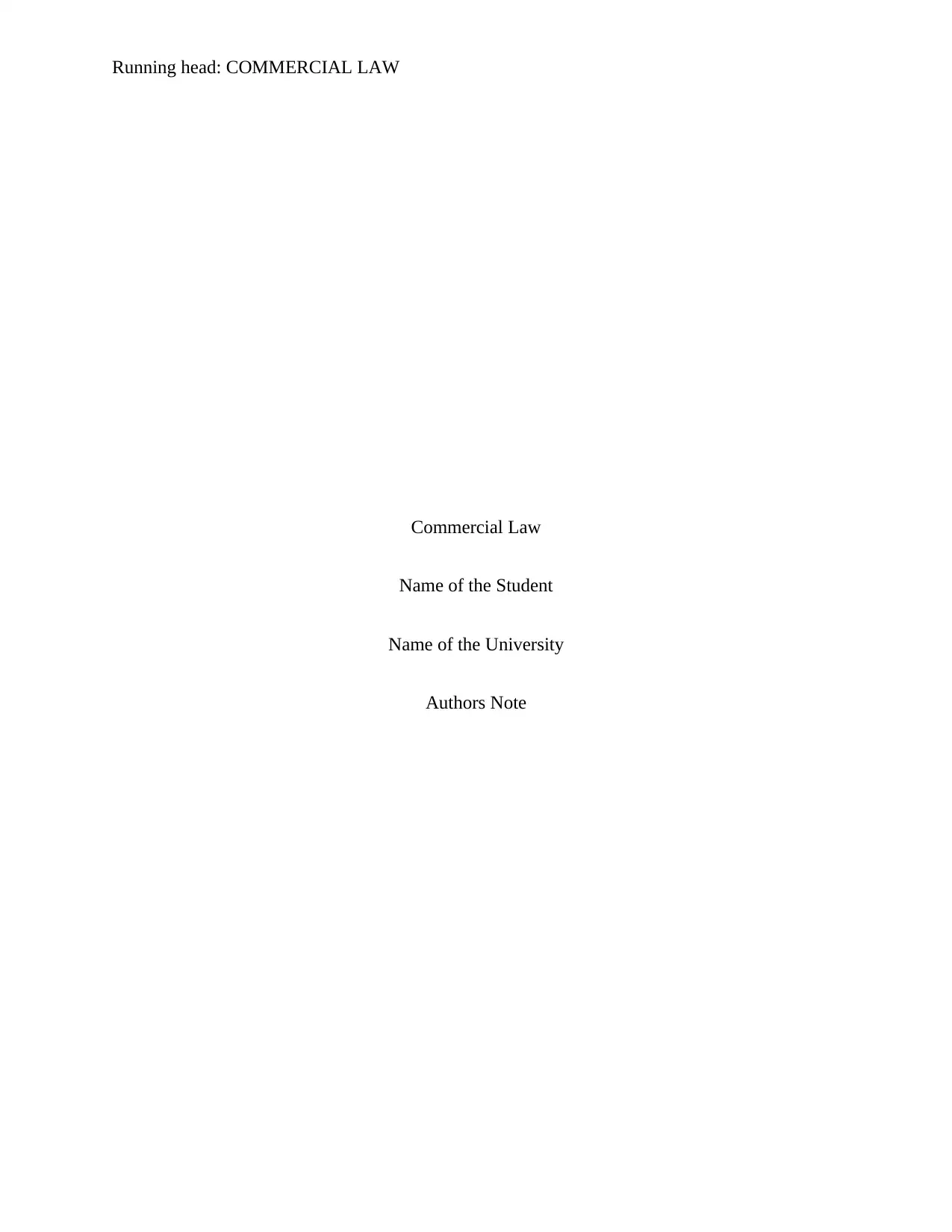
Running head: COMMERCIAL LAW
Commercial Law
Name of the Student
Name of the University
Authors Note
Commercial Law
Name of the Student
Name of the University
Authors Note
Paraphrase This Document
Need a fresh take? Get an instant paraphrase of this document with our AI Paraphraser
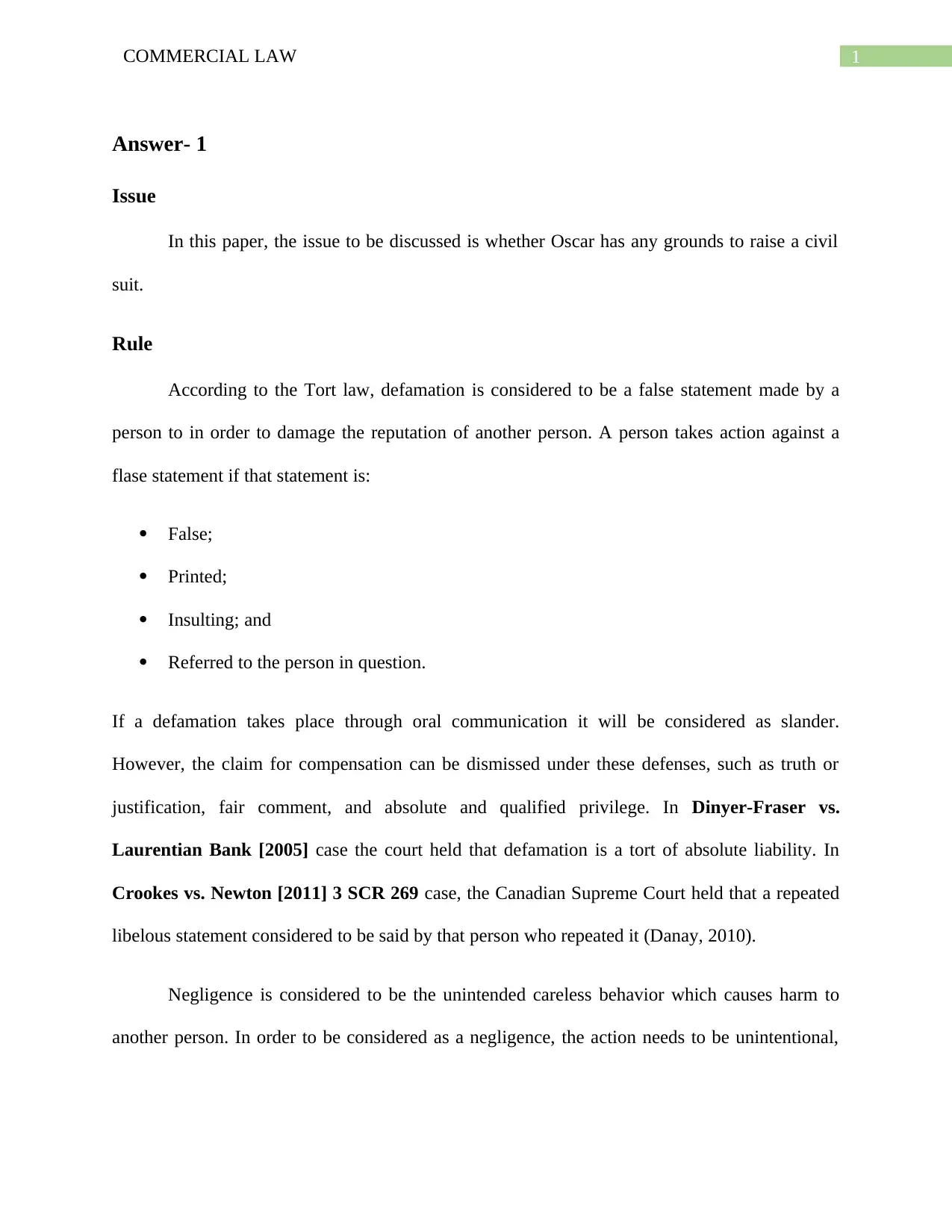
1COMMERCIAL LAW
Answer- 1
Issue
In this paper, the issue to be discussed is whether Oscar has any grounds to raise a civil
suit.
Rule
According to the Tort law, defamation is considered to be a false statement made by a
person to in order to damage the reputation of another person. A person takes action against a
flase statement if that statement is:
False;
Printed;
Insulting; and
Referred to the person in question.
If a defamation takes place through oral communication it will be considered as slander.
However, the claim for compensation can be dismissed under these defenses, such as truth or
justification, fair comment, and absolute and qualified privilege. In Dinyer-Fraser vs.
Laurentian Bank [2005] case the court held that defamation is a tort of absolute liability. In
Crookes vs. Newton [2011] 3 SCR 269 case, the Canadian Supreme Court held that a repeated
libelous statement considered to be said by that person who repeated it (Danay, 2010).
Negligence is considered to be the unintended careless behavior which causes harm to
another person. In order to be considered as a negligence, the action needs to be unintentional,
Answer- 1
Issue
In this paper, the issue to be discussed is whether Oscar has any grounds to raise a civil
suit.
Rule
According to the Tort law, defamation is considered to be a false statement made by a
person to in order to damage the reputation of another person. A person takes action against a
flase statement if that statement is:
False;
Printed;
Insulting; and
Referred to the person in question.
If a defamation takes place through oral communication it will be considered as slander.
However, the claim for compensation can be dismissed under these defenses, such as truth or
justification, fair comment, and absolute and qualified privilege. In Dinyer-Fraser vs.
Laurentian Bank [2005] case the court held that defamation is a tort of absolute liability. In
Crookes vs. Newton [2011] 3 SCR 269 case, the Canadian Supreme Court held that a repeated
libelous statement considered to be said by that person who repeated it (Danay, 2010).
Negligence is considered to be the unintended careless behavior which causes harm to
another person. In order to be considered as a negligence, the action needs to be unintentional,
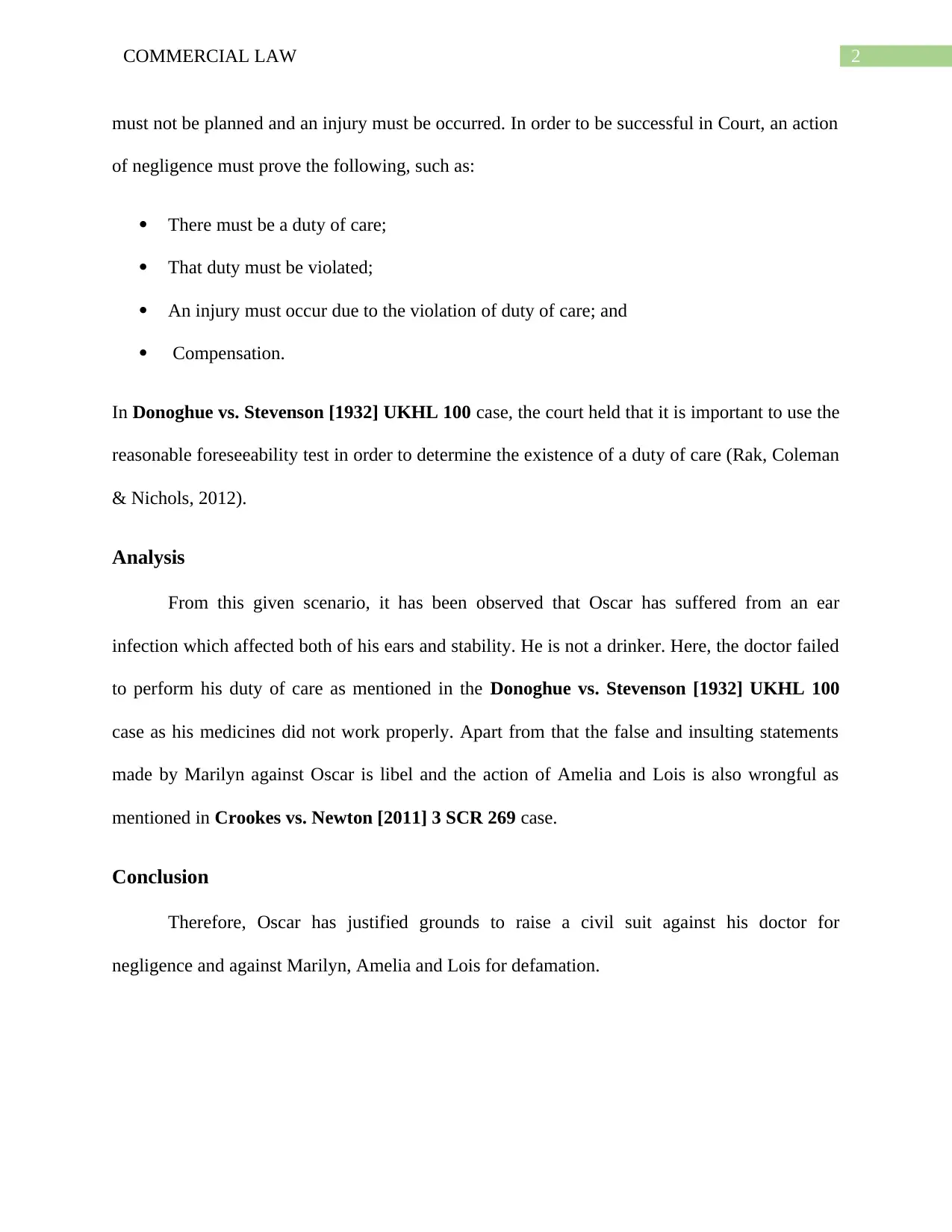
2COMMERCIAL LAW
must not be planned and an injury must be occurred. In order to be successful in Court, an action
of negligence must prove the following, such as:
There must be a duty of care;
That duty must be violated;
An injury must occur due to the violation of duty of care; and
Compensation.
In Donoghue vs. Stevenson [1932] UKHL 100 case, the court held that it is important to use the
reasonable foreseeability test in order to determine the existence of a duty of care (Rak, Coleman
& Nichols, 2012).
Analysis
From this given scenario, it has been observed that Oscar has suffered from an ear
infection which affected both of his ears and stability. He is not a drinker. Here, the doctor failed
to perform his duty of care as mentioned in the Donoghue vs. Stevenson [1932] UKHL 100
case as his medicines did not work properly. Apart from that the false and insulting statements
made by Marilyn against Oscar is libel and the action of Amelia and Lois is also wrongful as
mentioned in Crookes vs. Newton [2011] 3 SCR 269 case.
Conclusion
Therefore, Oscar has justified grounds to raise a civil suit against his doctor for
negligence and against Marilyn, Amelia and Lois for defamation.
must not be planned and an injury must be occurred. In order to be successful in Court, an action
of negligence must prove the following, such as:
There must be a duty of care;
That duty must be violated;
An injury must occur due to the violation of duty of care; and
Compensation.
In Donoghue vs. Stevenson [1932] UKHL 100 case, the court held that it is important to use the
reasonable foreseeability test in order to determine the existence of a duty of care (Rak, Coleman
& Nichols, 2012).
Analysis
From this given scenario, it has been observed that Oscar has suffered from an ear
infection which affected both of his ears and stability. He is not a drinker. Here, the doctor failed
to perform his duty of care as mentioned in the Donoghue vs. Stevenson [1932] UKHL 100
case as his medicines did not work properly. Apart from that the false and insulting statements
made by Marilyn against Oscar is libel and the action of Amelia and Lois is also wrongful as
mentioned in Crookes vs. Newton [2011] 3 SCR 269 case.
Conclusion
Therefore, Oscar has justified grounds to raise a civil suit against his doctor for
negligence and against Marilyn, Amelia and Lois for defamation.
⊘ This is a preview!⊘
Do you want full access?
Subscribe today to unlock all pages.

Trusted by 1+ million students worldwide
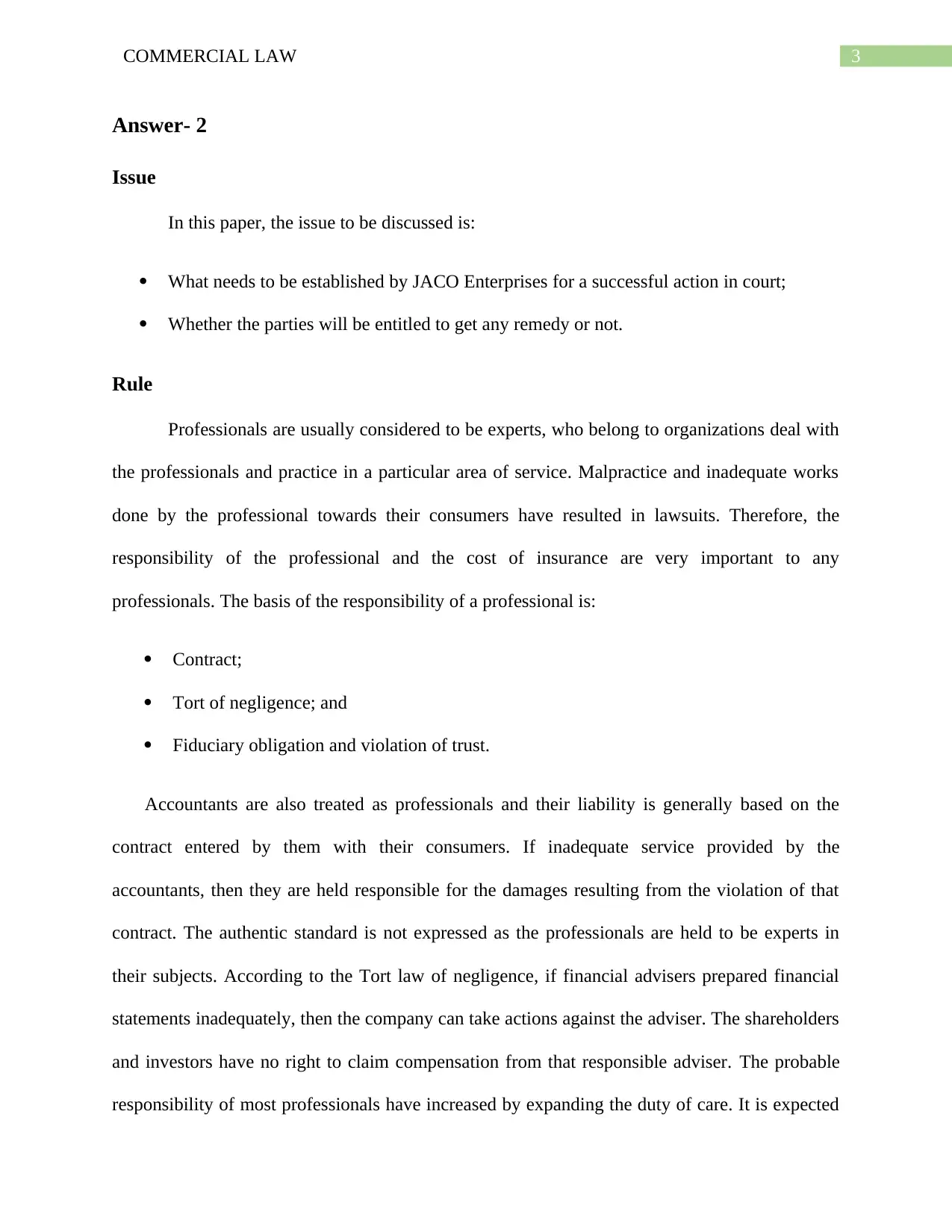
3COMMERCIAL LAW
Answer- 2
Issue
In this paper, the issue to be discussed is:
What needs to be established by JACO Enterprises for a successful action in court;
Whether the parties will be entitled to get any remedy or not.
Rule
Professionals are usually considered to be experts, who belong to organizations deal with
the professionals and practice in a particular area of service. Malpractice and inadequate works
done by the professional towards their consumers have resulted in lawsuits. Therefore, the
responsibility of the professional and the cost of insurance are very important to any
professionals. The basis of the responsibility of a professional is:
Contract;
Tort of negligence; and
Fiduciary obligation and violation of trust.
Accountants are also treated as professionals and their liability is generally based on the
contract entered by them with their consumers. If inadequate service provided by the
accountants, then they are held responsible for the damages resulting from the violation of that
contract. The authentic standard is not expressed as the professionals are held to be experts in
their subjects. According to the Tort law of negligence, if financial advisers prepared financial
statements inadequately, then the company can take actions against the adviser. The shareholders
and investors have no right to claim compensation from that responsible adviser. The probable
responsibility of most professionals have increased by expanding the duty of care. It is expected
Answer- 2
Issue
In this paper, the issue to be discussed is:
What needs to be established by JACO Enterprises for a successful action in court;
Whether the parties will be entitled to get any remedy or not.
Rule
Professionals are usually considered to be experts, who belong to organizations deal with
the professionals and practice in a particular area of service. Malpractice and inadequate works
done by the professional towards their consumers have resulted in lawsuits. Therefore, the
responsibility of the professional and the cost of insurance are very important to any
professionals. The basis of the responsibility of a professional is:
Contract;
Tort of negligence; and
Fiduciary obligation and violation of trust.
Accountants are also treated as professionals and their liability is generally based on the
contract entered by them with their consumers. If inadequate service provided by the
accountants, then they are held responsible for the damages resulting from the violation of that
contract. The authentic standard is not expressed as the professionals are held to be experts in
their subjects. According to the Tort law of negligence, if financial advisers prepared financial
statements inadequately, then the company can take actions against the adviser. The shareholders
and investors have no right to claim compensation from that responsible adviser. The probable
responsibility of most professionals have increased by expanding the duty of care. It is expected
Paraphrase This Document
Need a fresh take? Get an instant paraphrase of this document with our AI Paraphraser
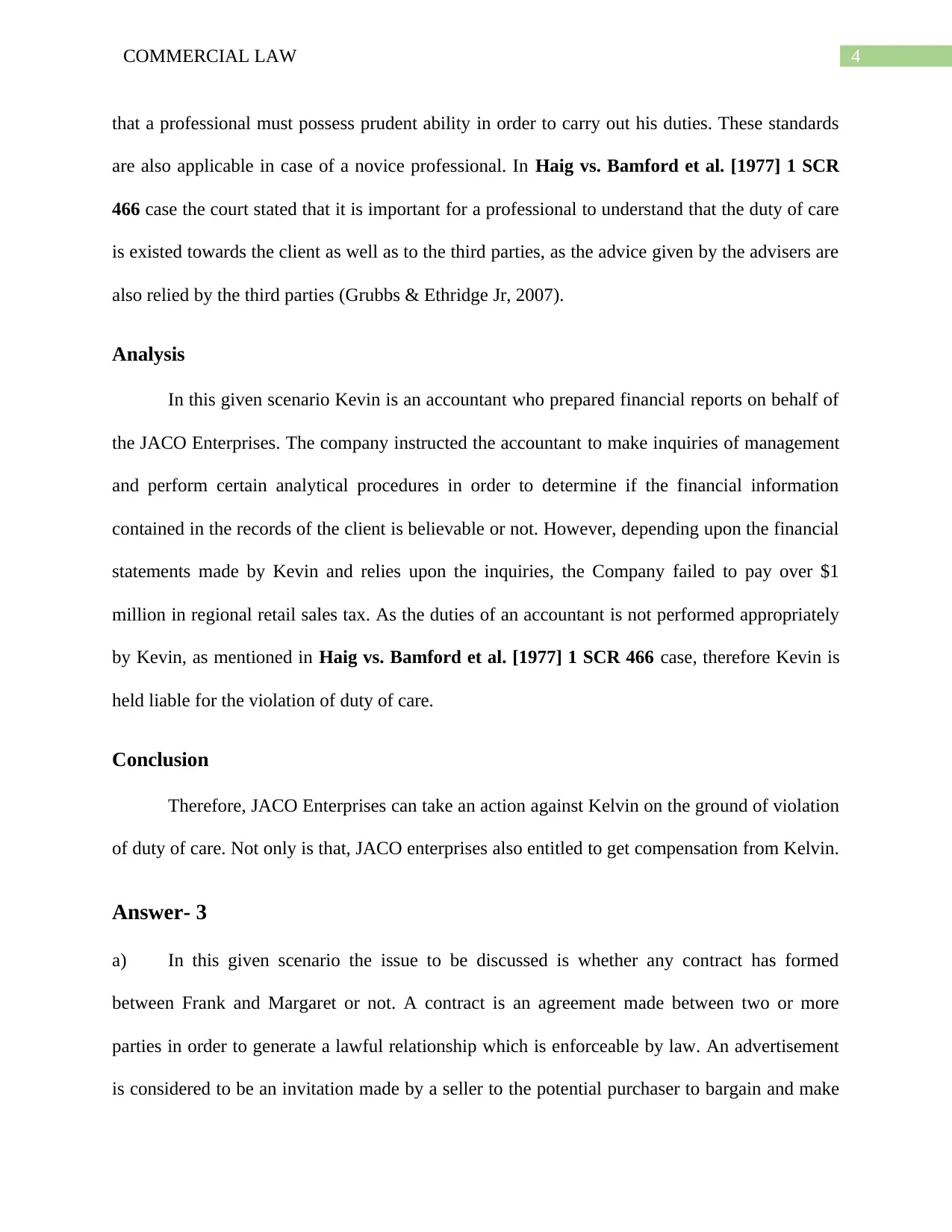
4COMMERCIAL LAW
that a professional must possess prudent ability in order to carry out his duties. These standards
are also applicable in case of a novice professional. In Haig vs. Bamford et al. [1977] 1 SCR
466 case the court stated that it is important for a professional to understand that the duty of care
is existed towards the client as well as to the third parties, as the advice given by the advisers are
also relied by the third parties (Grubbs & Ethridge Jr, 2007).
Analysis
In this given scenario Kevin is an accountant who prepared financial reports on behalf of
the JACO Enterprises. The company instructed the accountant to make inquiries of management
and perform certain analytical procedures in order to determine if the financial information
contained in the records of the client is believable or not. However, depending upon the financial
statements made by Kevin and relies upon the inquiries, the Company failed to pay over $1
million in regional retail sales tax. As the duties of an accountant is not performed appropriately
by Kevin, as mentioned in Haig vs. Bamford et al. [1977] 1 SCR 466 case, therefore Kevin is
held liable for the violation of duty of care.
Conclusion
Therefore, JACO Enterprises can take an action against Kelvin on the ground of violation
of duty of care. Not only is that, JACO enterprises also entitled to get compensation from Kelvin.
Answer- 3
a) In this given scenario the issue to be discussed is whether any contract has formed
between Frank and Margaret or not. A contract is an agreement made between two or more
parties in order to generate a lawful relationship which is enforceable by law. An advertisement
is considered to be an invitation made by a seller to the potential purchaser to bargain and make
that a professional must possess prudent ability in order to carry out his duties. These standards
are also applicable in case of a novice professional. In Haig vs. Bamford et al. [1977] 1 SCR
466 case the court stated that it is important for a professional to understand that the duty of care
is existed towards the client as well as to the third parties, as the advice given by the advisers are
also relied by the third parties (Grubbs & Ethridge Jr, 2007).
Analysis
In this given scenario Kevin is an accountant who prepared financial reports on behalf of
the JACO Enterprises. The company instructed the accountant to make inquiries of management
and perform certain analytical procedures in order to determine if the financial information
contained in the records of the client is believable or not. However, depending upon the financial
statements made by Kevin and relies upon the inquiries, the Company failed to pay over $1
million in regional retail sales tax. As the duties of an accountant is not performed appropriately
by Kevin, as mentioned in Haig vs. Bamford et al. [1977] 1 SCR 466 case, therefore Kevin is
held liable for the violation of duty of care.
Conclusion
Therefore, JACO Enterprises can take an action against Kelvin on the ground of violation
of duty of care. Not only is that, JACO enterprises also entitled to get compensation from Kelvin.
Answer- 3
a) In this given scenario the issue to be discussed is whether any contract has formed
between Frank and Margaret or not. A contract is an agreement made between two or more
parties in order to generate a lawful relationship which is enforceable by law. An advertisement
is considered to be an invitation made by a seller to the potential purchaser to bargain and make
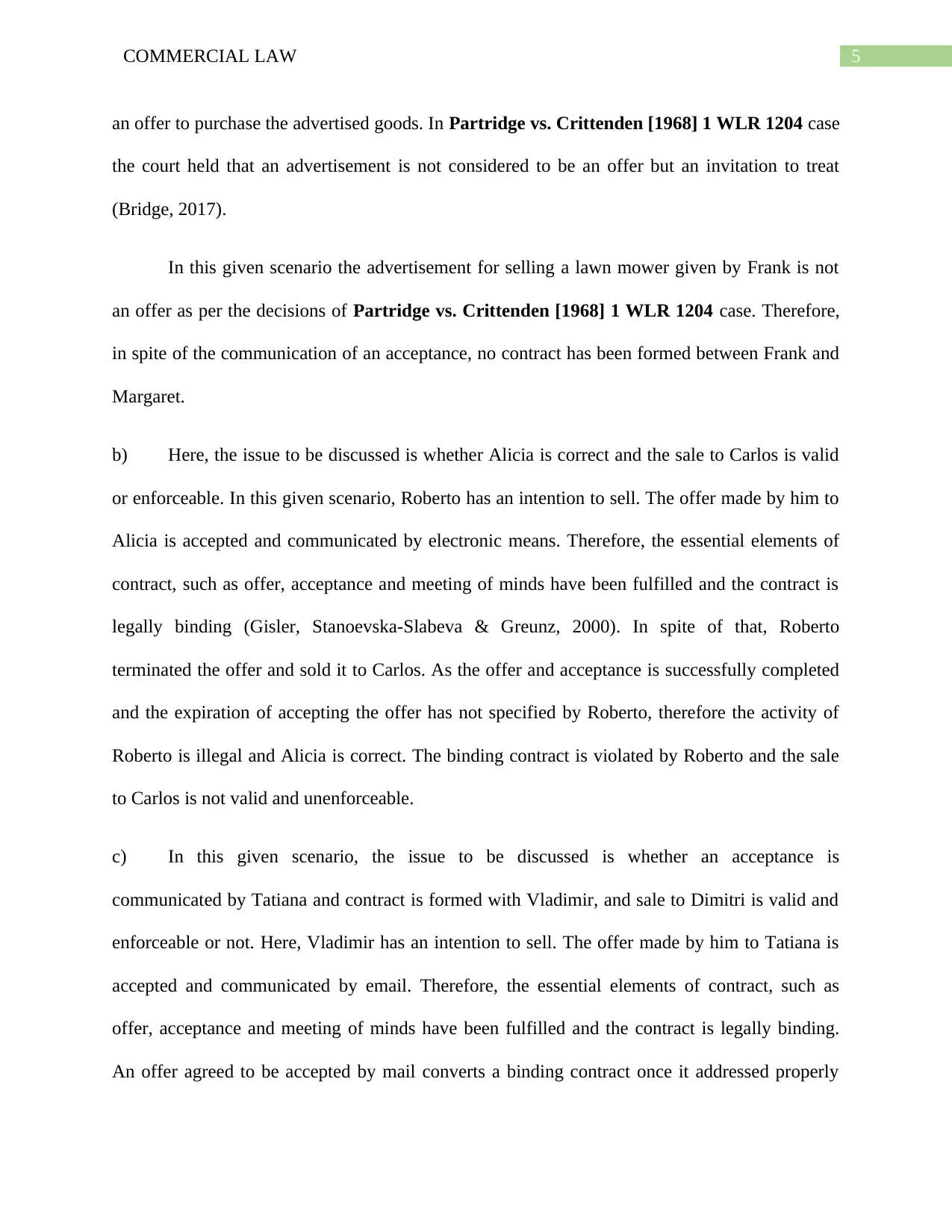
5COMMERCIAL LAW
an offer to purchase the advertised goods. In Partridge vs. Crittenden [1968] 1 WLR 1204 case
the court held that an advertisement is not considered to be an offer but an invitation to treat
(Bridge, 2017).
In this given scenario the advertisement for selling a lawn mower given by Frank is not
an offer as per the decisions of Partridge vs. Crittenden [1968] 1 WLR 1204 case. Therefore,
in spite of the communication of an acceptance, no contract has been formed between Frank and
Margaret.
b) Here, the issue to be discussed is whether Alicia is correct and the sale to Carlos is valid
or enforceable. In this given scenario, Roberto has an intention to sell. The offer made by him to
Alicia is accepted and communicated by electronic means. Therefore, the essential elements of
contract, such as offer, acceptance and meeting of minds have been fulfilled and the contract is
legally binding (Gisler, Stanoevska-Slabeva & Greunz, 2000). In spite of that, Roberto
terminated the offer and sold it to Carlos. As the offer and acceptance is successfully completed
and the expiration of accepting the offer has not specified by Roberto, therefore the activity of
Roberto is illegal and Alicia is correct. The binding contract is violated by Roberto and the sale
to Carlos is not valid and unenforceable.
c) In this given scenario, the issue to be discussed is whether an acceptance is
communicated by Tatiana and contract is formed with Vladimir, and sale to Dimitri is valid and
enforceable or not. Here, Vladimir has an intention to sell. The offer made by him to Tatiana is
accepted and communicated by email. Therefore, the essential elements of contract, such as
offer, acceptance and meeting of minds have been fulfilled and the contract is legally binding.
An offer agreed to be accepted by mail converts a binding contract once it addressed properly
an offer to purchase the advertised goods. In Partridge vs. Crittenden [1968] 1 WLR 1204 case
the court held that an advertisement is not considered to be an offer but an invitation to treat
(Bridge, 2017).
In this given scenario the advertisement for selling a lawn mower given by Frank is not
an offer as per the decisions of Partridge vs. Crittenden [1968] 1 WLR 1204 case. Therefore,
in spite of the communication of an acceptance, no contract has been formed between Frank and
Margaret.
b) Here, the issue to be discussed is whether Alicia is correct and the sale to Carlos is valid
or enforceable. In this given scenario, Roberto has an intention to sell. The offer made by him to
Alicia is accepted and communicated by electronic means. Therefore, the essential elements of
contract, such as offer, acceptance and meeting of minds have been fulfilled and the contract is
legally binding (Gisler, Stanoevska-Slabeva & Greunz, 2000). In spite of that, Roberto
terminated the offer and sold it to Carlos. As the offer and acceptance is successfully completed
and the expiration of accepting the offer has not specified by Roberto, therefore the activity of
Roberto is illegal and Alicia is correct. The binding contract is violated by Roberto and the sale
to Carlos is not valid and unenforceable.
c) In this given scenario, the issue to be discussed is whether an acceptance is
communicated by Tatiana and contract is formed with Vladimir, and sale to Dimitri is valid and
enforceable or not. Here, Vladimir has an intention to sell. The offer made by him to Tatiana is
accepted and communicated by email. Therefore, the essential elements of contract, such as
offer, acceptance and meeting of minds have been fulfilled and the contract is legally binding.
An offer agreed to be accepted by mail converts a binding contract once it addressed properly
⊘ This is a preview!⊘
Do you want full access?
Subscribe today to unlock all pages.

Trusted by 1+ million students worldwide
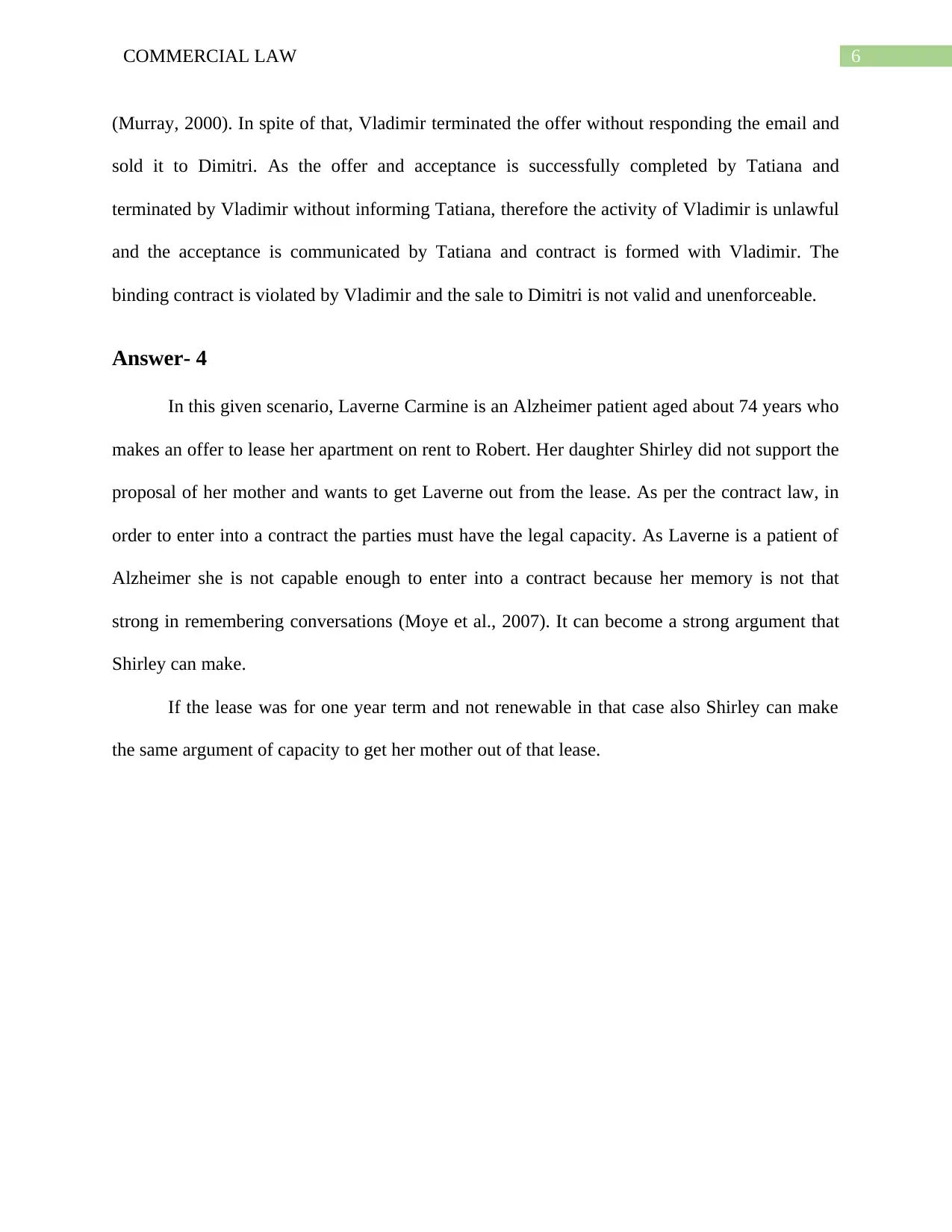
6COMMERCIAL LAW
(Murray, 2000). In spite of that, Vladimir terminated the offer without responding the email and
sold it to Dimitri. As the offer and acceptance is successfully completed by Tatiana and
terminated by Vladimir without informing Tatiana, therefore the activity of Vladimir is unlawful
and the acceptance is communicated by Tatiana and contract is formed with Vladimir. The
binding contract is violated by Vladimir and the sale to Dimitri is not valid and unenforceable.
Answer- 4
In this given scenario, Laverne Carmine is an Alzheimer patient aged about 74 years who
makes an offer to lease her apartment on rent to Robert. Her daughter Shirley did not support the
proposal of her mother and wants to get Laverne out from the lease. As per the contract law, in
order to enter into a contract the parties must have the legal capacity. As Laverne is a patient of
Alzheimer she is not capable enough to enter into a contract because her memory is not that
strong in remembering conversations (Moye et al., 2007). It can become a strong argument that
Shirley can make.
If the lease was for one year term and not renewable in that case also Shirley can make
the same argument of capacity to get her mother out of that lease.
(Murray, 2000). In spite of that, Vladimir terminated the offer without responding the email and
sold it to Dimitri. As the offer and acceptance is successfully completed by Tatiana and
terminated by Vladimir without informing Tatiana, therefore the activity of Vladimir is unlawful
and the acceptance is communicated by Tatiana and contract is formed with Vladimir. The
binding contract is violated by Vladimir and the sale to Dimitri is not valid and unenforceable.
Answer- 4
In this given scenario, Laverne Carmine is an Alzheimer patient aged about 74 years who
makes an offer to lease her apartment on rent to Robert. Her daughter Shirley did not support the
proposal of her mother and wants to get Laverne out from the lease. As per the contract law, in
order to enter into a contract the parties must have the legal capacity. As Laverne is a patient of
Alzheimer she is not capable enough to enter into a contract because her memory is not that
strong in remembering conversations (Moye et al., 2007). It can become a strong argument that
Shirley can make.
If the lease was for one year term and not renewable in that case also Shirley can make
the same argument of capacity to get her mother out of that lease.
Paraphrase This Document
Need a fresh take? Get an instant paraphrase of this document with our AI Paraphraser
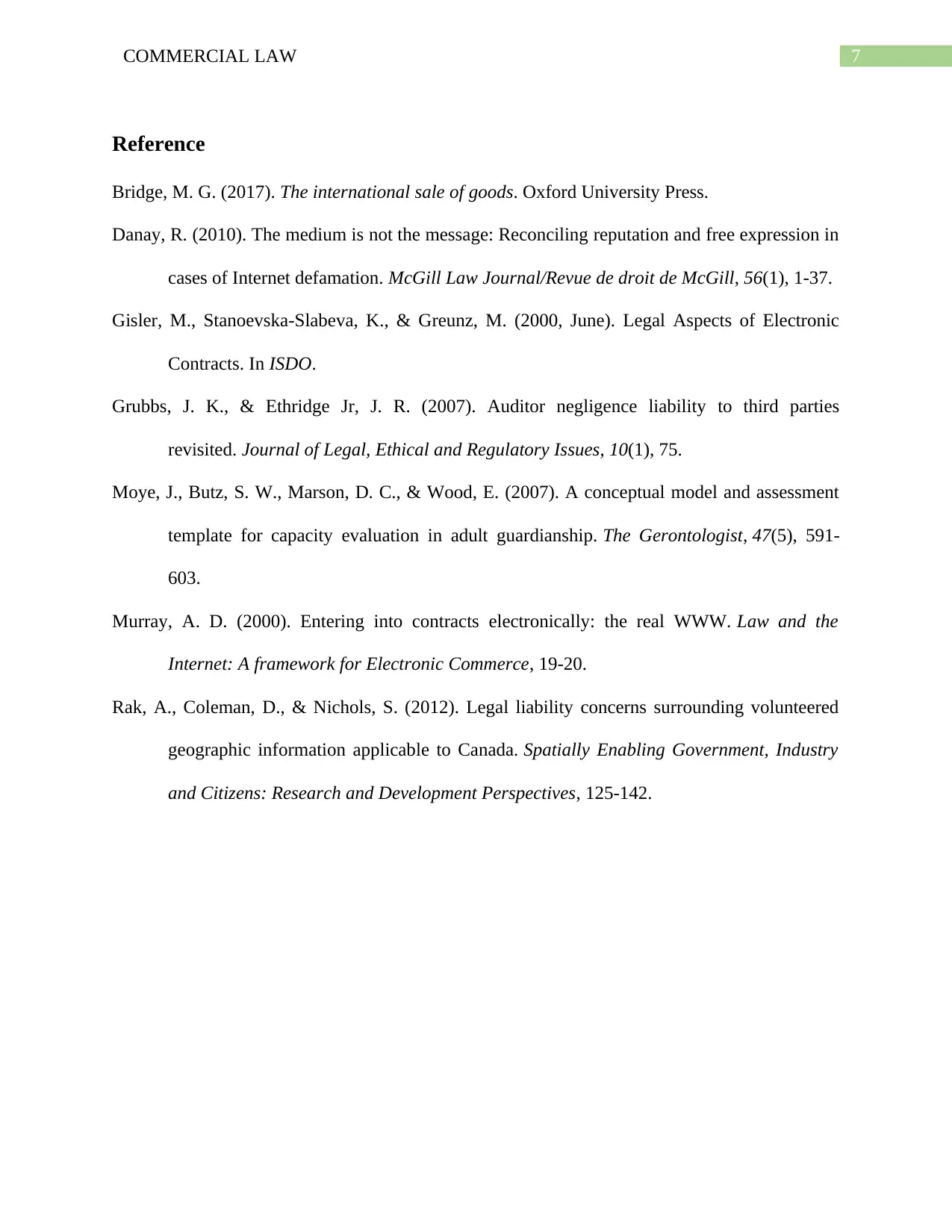
7COMMERCIAL LAW
Reference
Bridge, M. G. (2017). The international sale of goods. Oxford University Press.
Danay, R. (2010). The medium is not the message: Reconciling reputation and free expression in
cases of Internet defamation. McGill Law Journal/Revue de droit de McGill, 56(1), 1-37.
Gisler, M., Stanoevska-Slabeva, K., & Greunz, M. (2000, June). Legal Aspects of Electronic
Contracts. In ISDO.
Grubbs, J. K., & Ethridge Jr, J. R. (2007). Auditor negligence liability to third parties
revisited. Journal of Legal, Ethical and Regulatory Issues, 10(1), 75.
Moye, J., Butz, S. W., Marson, D. C., & Wood, E. (2007). A conceptual model and assessment
template for capacity evaluation in adult guardianship. The Gerontologist, 47(5), 591-
603.
Murray, A. D. (2000). Entering into contracts electronically: the real WWW. Law and the
Internet: A framework for Electronic Commerce, 19-20.
Rak, A., Coleman, D., & Nichols, S. (2012). Legal liability concerns surrounding volunteered
geographic information applicable to Canada. Spatially Enabling Government, Industry
and Citizens: Research and Development Perspectives, 125-142.
Reference
Bridge, M. G. (2017). The international sale of goods. Oxford University Press.
Danay, R. (2010). The medium is not the message: Reconciling reputation and free expression in
cases of Internet defamation. McGill Law Journal/Revue de droit de McGill, 56(1), 1-37.
Gisler, M., Stanoevska-Slabeva, K., & Greunz, M. (2000, June). Legal Aspects of Electronic
Contracts. In ISDO.
Grubbs, J. K., & Ethridge Jr, J. R. (2007). Auditor negligence liability to third parties
revisited. Journal of Legal, Ethical and Regulatory Issues, 10(1), 75.
Moye, J., Butz, S. W., Marson, D. C., & Wood, E. (2007). A conceptual model and assessment
template for capacity evaluation in adult guardianship. The Gerontologist, 47(5), 591-
603.
Murray, A. D. (2000). Entering into contracts electronically: the real WWW. Law and the
Internet: A framework for Electronic Commerce, 19-20.
Rak, A., Coleman, D., & Nichols, S. (2012). Legal liability concerns surrounding volunteered
geographic information applicable to Canada. Spatially Enabling Government, Industry
and Citizens: Research and Development Perspectives, 125-142.
1 out of 8
Your All-in-One AI-Powered Toolkit for Academic Success.
+13062052269
info@desklib.com
Available 24*7 on WhatsApp / Email
![[object Object]](/_next/static/media/star-bottom.7253800d.svg)
Unlock your academic potential
Copyright © 2020–2026 A2Z Services. All Rights Reserved. Developed and managed by ZUCOL.

